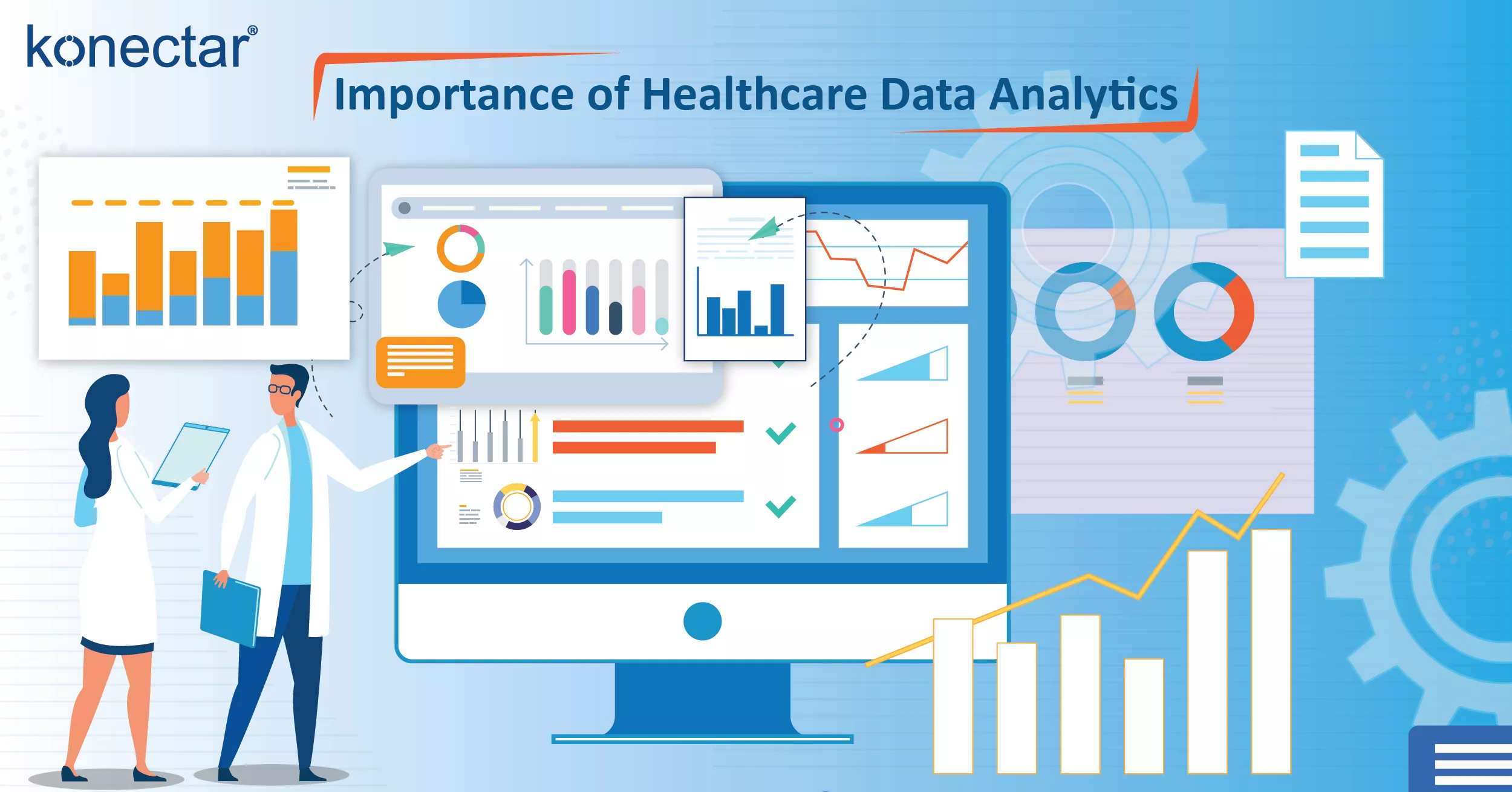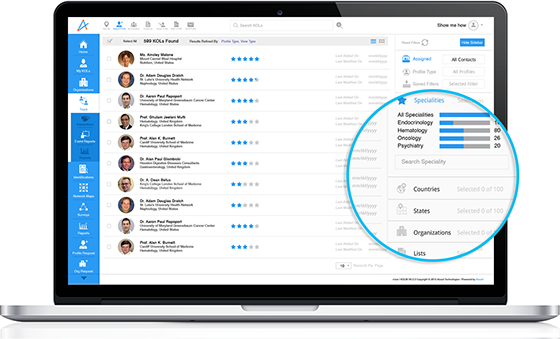8 Sep 2023
The Importance of Healthcare Data Analytics

In the era of technological advancements, data is heralded as the new gold. Nowhere is this truer than in the realm of healthcare, where healthcare data analytics is rapidly becoming a game-changer. Let us explore the profound significance of this transformative force in healthcare.
In this article:
- 1. The Role of Data Analytics in Healthcare
- 2. An Overview of the Global Healthcare Analytics Market
- 3. Choosing the Right Data Analytics Software Provider: Key Tips and Considerations
- 4. FAQs
- 5. Conclusion
Traditionally, the healthcare sector has been somewhat hesitant to embrace new technologies. However, the landscape changed dramatically with the onset of the COVID-19 pandemic.
This global health crisis was a pivotal moment for the industry, compelling healthcare companies to adopt innovative technologies swiftly. These advancements have been instrumental in elevating patient care, expediting drug development, and meeting the evolving demands of the healthcare market for DOLs.
The Role of Data Analytics in Healthcare
-
Drug Discovery
Drug discovery is a crucial area where advanced big data analytics in healthcare techniques are used to analyze large volumes of data and validate drug targets. It reduces the time and cost required to develop new drugs.
In contemporary pharmaceutical research, numerous opportunities arise for integrating artificial intelligence (AI) and machine learning (ML) with big data to enhance drug discovery processes for predicting protein folding, analyzing protein-protein interactions, conducting virtual screenings, employing quantitative structure-activity relationship (QSAR) analysis, facilitating de novo drug design, and exploring drug repurposing opportunities.
A variety of methodologies, including high throughput virtual screening (HTVS), molecular docking, pharmacophore modeling, QSAR, and molecular dynamics simulations, are commonly employed to expedite the drug discovery pipeline.
Utilizing computer-based approaches, virtual screening emerges as an important tool for swiftly identifying promising candidate molecules from extensive compound libraries. By leveraging these technologies, researchers are able to efficiently filter potential drug candidates against specific targets, facilitating early-stage drug discovery initiatives.
-
Precision Medicine
It helps to analyze vast datasets, including genomics, patient histories, and lifestyle factors, to create personalized treatment plans. This individualized approach ensures patients receive treatment that is unique to their genetic makeup.
-
Operational Efficiency
The analytics platform optimizes resource allocation, enhances workflow efficiency, and reduces administrative overhead in hospitals and healthcare facilities. This allows organizations to focus their resources where they matter most: patient care.
Moreover, sophisticated analytics tools such as predictive monitoring have the capability to monitor product quality throughout each stage of production. Detecting even minor deviations in quality promptly enables engineers to address process issues or equipment malfunctions before large quantities of product become unusable, thus ensuring adherence to regulatory requirements. Utilizing real-time analytics, batch processes can be continuously monitored, facilitating swift adjustments and reducing the risk of batch failures or rejections.
-
Public Health Initiatives
One of the biggest benefits of data analytics in healthcare is its application in managing public health initiatives. By analyzing population-level data, health authorities can identify disease outbreaks, allocate resources effectively, and implement preventive measures. Data analysis helps public health experts pinpoint risk factors linked to different diseases and health issues, enabling targeted interventions to effectively address the specific needs of vulnerable populations.
Using data to guide decisions in public health programs ensures that resources are directed where they're most needed. Analyzing data helps identify specific areas or groups requiring extra support, maximizing the impact of interventions and promoting fair access to healthcare.
-
HCP Identification
AI (Artificial Intelligence)-Powered healthcare data analytics platforms enables life sciences companies to analyze data points across the web to identify relevant KOLs (Key Opinion Leaders). This eliminates the tedious task of manually scouring the data sources, saving time and effort. The insights provided by the platform empower medical and commercial teams to seamlessly discover healthcare experts that align with their specific initiatives, such as drug development, product launches, clinical trials, etc.
Big Data Analytics in precision medicine helps to discover biomarkers, categorize diseases, repurpose drugs, and combine different types of biological data with electronic health records (EHR). This helps tailor treatment plans for patients based on their specific characteristics.
An Overview of the Global Healthcare Analytics Market
Studies depict that the Global Healthcare Analytics Market, which was valued at $21.1 billion in 2021, is zooming ahead faster and poised to reach $85.9 billion by 2027. This is aided by the growing digitization in healthcare. Furthermore, North America, Europe, and The Asia Pacific are the regions that will continue to drive growth. This HCP data underscores the tremendous growth and significance of analytics in healthcare.
Choosing the Right Data Analytics Software Provider: Key Tips and Considerations
Selecting the right company is essential to leverage the platform's power. Here are a few questions to consider when choosing an analytics software provider:
-
How does the data analytics platform help to scale the operations?
Irrespective of the software a healthcare enterprise uses for its varied objectives, it is imperative to check its data processing capability and whether it can generate real-time insights. That's because silos of data are generated in the healthcare setup daily, and one will need a platform that is customizable and built to scale.
-
Does the company have an explicit SLA (Service Level Agreement)?
An analytics software provider you intend to partner with should have an SLA outlining the response time, time for restoration, and time for resolution in case of unexpected events. Having an SLA can ensure the company is committed to providing prompt and quality service.
-
Does the company follow all compliances?
The company should thoroughly understand the regulatory environment in which it operates. This also includes understanding data security, privacy, and confidentiality requirements. Ensuring it has the necessary certifications and compliance measures to meet your company's specific requirements is also essential.
FAQs
-
What is healthcare data analytics?
Healthcare data analytics involves analyzing vast amounts of healthcare-related data to extract valuable insights that can improve patient care, streamline operations, and drive better decision-making in the healthcare industry.
-
How does big data analytics benefit drug discovery?
It helps researchers analyze large datasets to identify potential drug targets, expedite the drug development process, and improve the efficiency of clinical trials. This leads to the discovery of new medications to treat various diseases.
-
What role does data analytics play in precision medicine?
Data analytics enables precision medicine by analyzing genomic data, patient histories, and lifestyle factors to develop personalized treatment plans tailored to individual patients' unique characteristics, improving treatment outcomes and patient satisfaction.
-
How does data analytics contribute to operational efficiency in healthcare facilities?
It optimizes resource allocation, enhances workflow efficiency, and reduces administrative overhead in hospitals and healthcare facilities, allowing organizations to focus on delivering high-quality patient care while maximizing operational effectiveness.
-
What are the key considerations when choosing a data analytics software provider for healthcare?
When selecting a data analytics software provider for healthcare, it's essential to consider factors such as scalability, service level agreements (SLAs) for response and resolution times, and compliance with regulatory requirements for data security and privacy to ensure the platform meets the organization's specific needs and standards.
Conclusion
Data can be incredibly granular, containing a wealth of information to be analyzed and leveraged to generate valuable insights. As the Life Sciences sector continues to produce more data, the importance of data analytics will become even more crucial in the days to come.
If you're seeking intelligent analytics and valuable insights into the HCP landscape to enhance your services or collaborate with the right medical experts, look no further than konectar. To learn more, Book a Demo now!






